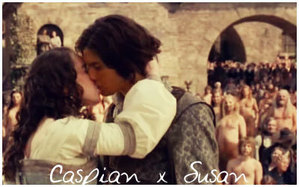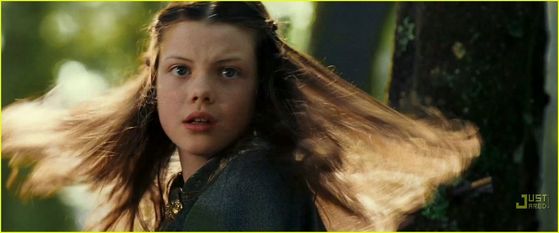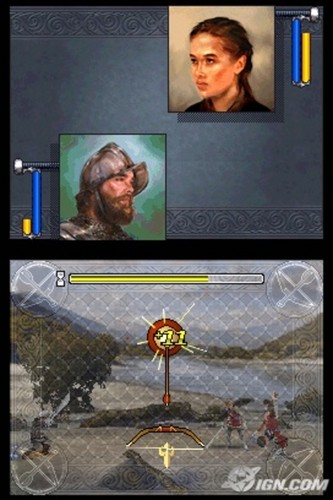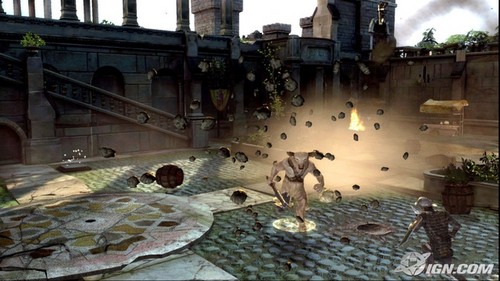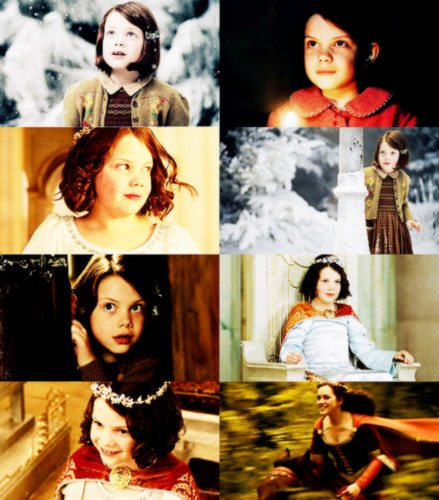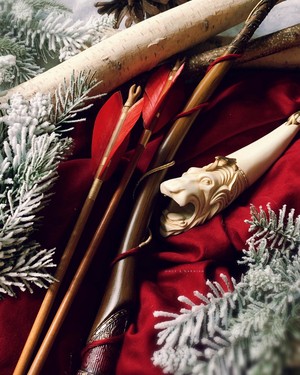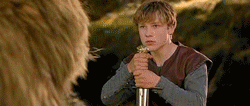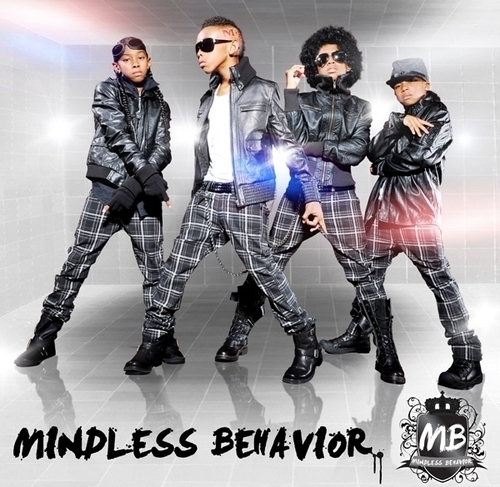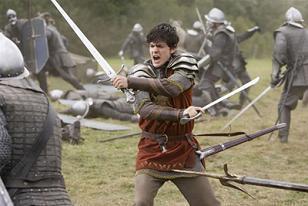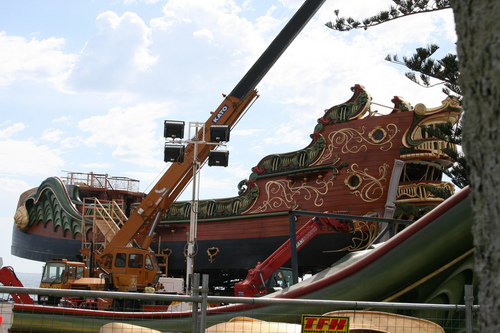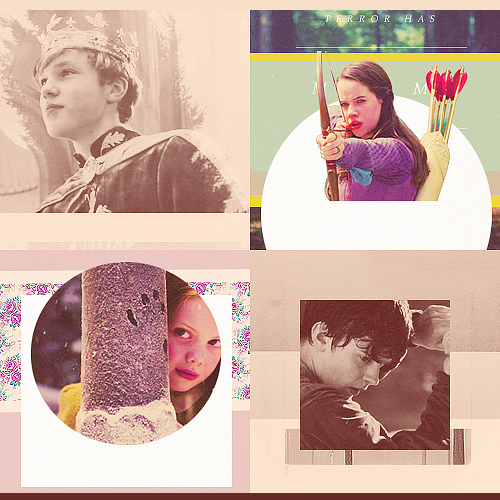くま, クマ in mind I didn't make this up, I just copy and pasted it.
(WARNING: This is very long)
Synopsis
The four Pevensie children return to a wild Narnia, about a 1000 years after their 前 visit. Aiding the rightful heir, Prince Caspian, in his attempt to overthrow his usurping uncle, Lord Miraz, the Pevensie children succeed in freeing the rightful people of Narnia and restore it – with the aid of Aslan.
Film in General
Compared to the first film (The Lion, the Witch and the Wardrobe) directed によって Adamson, around 3 years ago, Prince Caspian is a `darker` film, to be sure. However, concerned parents should not be put off によって the action packed trailer. While many do die, blood and violence is definitely not focussed on – leaving the message of the dangers of war still strong, without, what some would consider, unnecessary gore.
CG usage and 芝居 abilities has also risen favorably in this film – with a solid cast now used to 芝居 within the world of Narnia. The children are believable in their struggles (personal または national), the new Narnians we are introduced to are engaging and the Telmarines are depicted in a very complex manner. Prince Caspian in particular is set very carefully in a social framework and his hesitancy (more on that later) is adequately covered, I think.
Once again, Adamson and Gresham seem to be still tying the everday life of our world in with the Narnian world, which I think is an important piece in this series – since the children, we must remember, are as much a product of Earth`s society, as well as Narnian. Therefore, the issue of agency which plagues Peter and the social mores which Susan is learning to juggle are touched on briefly – no doubt in preperation for the revelation at the end of the film.
Also, another important factor, the soundtrack is a good grounding for the hearer. Familiar melodies will be recognized によって the watcher, for example, Imogen Heap`s song is used at the beginning during the ビーチ scene… and there is a definite touch of Kingdom of Heaven in some of the battle scenes. I found the last track and the goodbye scenes to be very well done, to be honest. It really tugged on your ハート, 心 strings in a soft gentle way (similar to the goodbye scene in Lord of the Rings: Return of the King) – but as they turn away, Regina Spektor (the new choice for the ending) begins her song `The Call`. My お気に入り lines in her song are:
Now we’re back to the beginning
It’s just a feeling and now one knows yet
But just because they can’t feel it too
Doesn’t mean that あなた have to forget
Let your memories grow stronger and stronger
‘Til they’re before your eyes
You’ll come back
When they call you
No need to say good bye
I think this was a PARTICULARLY good piece to end the movie with. It is a moving, simple song which reminds us all that memory plays a large part in how we say goodbye. This also shows us the importance of moving on and looking back at the same time (a key theme for Peter and Susan).
Differences Between the Book and the Movie
As per usual with movies, there are changes made in the transition between book and movie, I will discuss the impact of this later, but for now, a little discussion on some changes (for those who have not read it yet, または haven`t read it for some time).
1. Prince Caspian: In the book, he is depicted as being young (around Peter`s age) and golden-haired, looking like his father. He is not, in fact, introduced at the very beginning of the book, but rather his story is told as a story within the story. This style of storytelling does two things. It shortens the length of the 全体, 全体的です story and subtracts from the importance of Prince Caspian as a person – in a way, pushing his journey to the background in favor of 表示中 the journey of the children. In the movie, however, Prince Caspian`s story begins the movie, bringing him, in my opinion, much closer to us the viewer – and causing us to invest in his story as equally as anyone elses. Also, the 質問 of accent and coloring comes up. The 質問 is – why the Spanish-Mediterranean influence?
2. Sequence of Events: In the book, chronologically (not in order of the story telling), Caspian flees, gathers the Narnians and then summons the children during a skirmish. They are pulled from our world to a place near Cair Paraval and then set about “solving” the mystery, and then eventually meet Trumpkin and get filled in on all the details. Then they get to meeting Prince Caspian – but not before the girls are taken によって Aslan to create backup in other parts of the realm. It is the two boys who come in time to stop the revival of the White Witch and Peter duels King Miraz – a battle ensues and the reinforcements brought によって Aslan save the day.
In the movie, the children are summoned on the very night Prince Caspian flees – thereby crunching time even smaller than before. Trumpkin doesn’t get caught (as far as the viewer can tell) in his attempt to reach the children – rather the meeting appears to be もっと見る accidental (unless there are deleted scenes, which could be possible). They ALL go to Aslan’s How and decide that waiting for Aslan isn’t going to work and attempt a raid on Miraz’s castle. Which goes dreadfully wrong. Three courses of action then are worked through: there is the attempted revival of the White Witch (which fails), the use of a duel to delay the inevitable (which succeeds for the most part) and Lucy ends up going alone to find Aslan to find aid (which comes in the form of trees and the river spirit).
3. Tensions between Prince Caspian and Peter and Susan: Prince Caspian, Peter and Susan all have chemistry going on between them. We have the disappointment of Susan in Peter for failing to be mature (at the beginning). We have Prince Caspian and Peter contending over who is to blame for the current sorry state of Narnia. And then there is an added romantic theme between Prince Caspian and Susan which culminates in a キッス at the end of the film. None of this was originally in the novel.
4. Presence of Aslan: In the first film, there is this anticipation of Aslan’s coming that is very hopeful and exciting – which is similar to waiting for Christmas. However, in Prince Caspian, the need for Aslan is much もっと見る desperate – although I hardly think Lord Miraz is half the threat the White Witch presented. Despite that, there is a much higher demand for Aslan – which is furthered によって his conspicuous absence. Only Lucy glimpses a few times, and for a while, the viewer wonders if they will see Aslan outside of the context of dreams または visions. In fact, in the movie, Aslan is not revealed to anyone (except Lucy) until the 秒 climax of the final battle. Compared to the book, where Aslan although not present at the beginning, appears sooner than later, has much higher agency, the film seems to be saying something very interesting about the relationship between Narnia and Aslan…
About the Differences… So What?
When I was a first time theater viewer (back when I was a late teenager), my literary taste was shocked and displeased によって the way that various films took liberalities with what I considered to be untouchable classics (for example, Lord of the Rings). However a course in film and theatre, as well as some basic research on the film making process has 与えられた me a もっと見る balanced view on the whole process between film and book. In the case of stories such as Lord of the Rings, there may be a negative impact on the story’s original interpretations, however, a few 本 have survived the filmmaking process to become that much more. Pride and Prejudice as well as Charlie and the チョコレート Factory are brought to mind.
Therefore, before looking at the impact of film-book differences, we should consider Lewis’ 本 as a whole. His books, being もっと見る または less allegorical, have a limited set of signs and interpretations. Which isn’t bad. But, consider the series: The Lion, the Witch and the Wardrobe [importance of sacrifice and salvation], The Horse and His Boy [sovereignty of God], The Magician’s Nephew [creation, beginnings, renewal], The Silver Chair [existance of God and values, obedience], The Last Battle [last days, judgement, heaven]. In these heavy contexts, the two 本 Prince Caspian and The Voyage of the Dawn Treader seem to have very little spiritual significance. At least, in The Voyage of the Dawn Treader, there is this issue of your calling in life and repentance… but within the pages of Prince Caspian, the meanings seem to be either hidden または もっと見る complex.
Perhaps it is the fault of the author? Who knows… but the movie, with it’s changes, creates a better, clearer set of spiritual signficances to draw from for the viewer.
1. Prince Caspian: Unlike the book, we have a much もっと見る clearer look at his psyche. We see hesitancy, humility, determination and a desire for vengeance. He tells Aslan that he does not think he is ready to be the King of Narnia, which Aslan states is the perfect attitude he wants in the King. This of course brings to the fore a common refrain in the Chronicles series. Aslan tells the same thing to the first king of Narnia in The Magician’s Nephew. The idea of humility creating a strong leader reinforces the Biblical principle of God working through our weakness. In this way, perhaps, Prince Caspian could be a もっと見る positive Aragorn type. On the other hand, we do see that Prince Caspian is a strong person as well. He not only is very defensive around Peter – but also… has a desire to see his father’s killer dead. But once again, Prince Caspian’s refusal to kill his Uncle for revenge (even in fair combat) shows the importance of forgiveness and cutting his ties to the label of “telmarine king”.
2. Peter: I always did wonder about him. He was a child, who became a man in a magical country – how WOULD あなた feel if あなた returned back to the body of a child? Especially in a war torn country, there’d be this pent-up frustration and a desire to 表示する his quality. Emo!Peter in the film was rather hard for me to take. But it was understandable. After all, he begins angry and frustrated about his lack of agency in his life (as compared to his reign as an adult king in Narnia) – his return to Narnia, I think, then is about him trying to control his life. To reown it as it were. Which explains the whole “High King Peter the Magnficent” introductions. This creates uppity feelings between him and Prince Caspian, understandably – and there is even 2 crossings of swords. During the 2nd altercation, accusations fly between them. Caspian’s accusation “you LEFT Narnia” pinpoints Peter’s 情報源 of frustration – his lack of agency to even stop his return to home. At any rate, his desire for personal control spreads outwards – until he and everyone else agrees that there is no time to wait on Aslan and they go ahead with the first foolhardy attack on Miraz’s 城 which results in unnecessary deaths. によって the end of the film, Peter has learned his lesson to lay everything down in faith at Aslan’s feet – and wait on the Lion’s time. The only thing I thought 驚異 was how we do not see his actual transition so that when he accepts his inability to return to Narnia as a maturation thing. He tells Lucy it’s an adult thing and that she’d understand. I guess that small scene where we see Aslan walking with Susan and Peter was actually just part of a LONG conversation…
3. Susan: Susan was always a hard character to grasp in the 本 and the films. She is after all, the older sister – but unlike a boy, there is very little for her grasp in the world (if あなた think about it). Lucy, being tomboyish, enjoyed Narnia… but within Susan, there is this aloofness which is solidified within Prince Caspian. She fails to see Aslan as easily as the others. And in the movies, her interest in Prince Caspian clearly coincides with her shifting of focus onto “this world’s” life. The kiss, then, at the end of the movie, when read in the context of Susan’s movement from Narnian belief to hard-boiled adult worldliness, actions like this aren’t out of character. I always felt in the 本 that Susan’s absence in The Last Battle was rather abrupt and kind of shocking. As it should be, perhaps – which then solidifies the important lesson about “backsliding” または “losing the faith”. However, Susan then loses significance as a person and the book loses もっと見る of its humanity in order to consolidate the allegory. The boy-girl interaction at the beginning of this film, the flirting, the inability to see Aslan, her admission that she was just getting used to England and the キッス – these all contribute to a much もっと見る complex character that can become a greater impact later – because we know how she feels and where she is coming from. However… one または two 質問 plague me… how does she keep her eyeliner so nicely all the time? And why did her hair get darker in the final scene?
4. Changes in Story: I think the added attack on Miraz’s 城 was bizarre. But I thought about it… and realized that it was in fact very functional. For one thing, it is the downfall of both Prince Caspian and Peter’s egos. It shows the importance that man proposes but God disposes. That even the best laid plans go astray without the right backing. Also, it recovers the Professor from Miraz’s grip (which went differently in the book)… This sequence also shows the power and cunning of Miraz, the military strategies of Telmarines and adds a time delay factor to the whole story. From a film maker’s perspective, as well, Prince Caspian is a woefully short book – adding something like this increases the length of the film. One might argue that it would have been equally justifiable to put in the whole Aslan in Beruna part (as in the novel) または increase the beginning sequences of the children’s discovery of Cair Paraval. However, the Aslan in Beruna part would have raised 質問 among parents. After all, in a society that is already struggling to control various substance abuses, having things like Baccheus in a family film would be iffy to market – and would cause alot of misinterpretation among もっと見る conservative circles who already struggle with Lewis’ not so secret affinity for Grecian myths. As for the “discovery of Cair Paraval” sequence – the change there is actually quite simple to understand. After all, the film is called “Chronicles of Narnia” – which means that we know it is a continuation of the 前 film. Any mystery is then taken away from the discovery – because the viewer already knows where the children are and very few watchers would watch something that is labouring over a various obvious point.
5. Presence of Aslan: The absence of Aslan (compared to the book where he appears もっと見る often and sooner) is もっと見る understandable if あなた take into account the point of the movie which I suggested above. A very accessible Aslan would undercut the importance of “waiting” and “faith”. His absence which causes anxiety is therefore part of the lesson which was missing from the book – and serves only to make the plot stronger.
My feelings…
I went into the film with low expectations. Probably it was because I never really was a Prince Caspian book fan. Perhaps because I did not expect it to make any points または state anything of significance. However, the film pleasantly suprised me.
1. Reepicheep: Was a barrel of laughs. He was quite cute and charming – and he and his マウス clan were very believable. The voice for Reepicheep (Eddie Izzard) had all the right nuances that I would expect and I felt he very much ストール, 盗んだ the 表示する as a Narnian creature – and I hope they get him into The Voyage of the Dawn Treader film as such.
2. Prince Caspian: After getting over the shock of a Mediterranean styled Prince Caspian, I quite enjoyed Ben Barnes’ performance. He had grace, manliness. He was cute and fit. He was older, but he still has a youthful air about him. Because of the “Telmarine” accent and coloring, there is this feeling of alienation between him and EVERYONE else – which is very interesting and shows how anyone can be used によって Aslan for the greater good – if they are ready and willing. There is a hesitancy around the whole figure which was great. The end scene were he remains bowing despite Aslan’s command for the Kings and Queens of Narnia to rise – was quite a moe moment.
3. Trumpkin: Another good character with great dialogue pieces which made us giggle.
4. Edmund: With Prince Caspian, Peter and Susan running around in their emo-ness – and while Lucy sits around waiting for Aslan, it seems like Edmund is doing alot. He’s the one who’s got Peter’s back, is the only male to stand up to the White Witch and seems to have his head screwed on straight. Although he had few lines, Skandar Keynes did a great job I think, and delivered all of them quite well.
5. White Witch Scene: This whole scene was great because it reminds us of the old evils we always have to be wary of. It tells us of the danger of turning to anything else besides God when we have decision making issues. Although many would see this as a specific attack against paganism または satanism, I’d read this in a もっと見る general light – the idea that waiting for Aslan alone is all that is necessary. Once again – it’s interesting to see how Edmund is the man to step in the gap here.
6. Feelings of Farewell: This was mainly brought on によって the last song によって Regina Spektor – but at this time of my life, where I too have to say farewell to many things… I understand the pain of saying goodbye to various things. I know i can revisit them, but as Peter said, it’s an adult thing. The underlying message of maturation here reminds me that our lives are a series of changes, and we should accept the necessary changes. And with that, remember that Aslan (or God) is also there beside us, unchanging – and yet, growing with us as we grow in our perception of Him.
In all… out of 5 stars… a 4.
(WARNING: This is very long)
Synopsis
The four Pevensie children return to a wild Narnia, about a 1000 years after their 前 visit. Aiding the rightful heir, Prince Caspian, in his attempt to overthrow his usurping uncle, Lord Miraz, the Pevensie children succeed in freeing the rightful people of Narnia and restore it – with the aid of Aslan.
Film in General
Compared to the first film (The Lion, the Witch and the Wardrobe) directed によって Adamson, around 3 years ago, Prince Caspian is a `darker` film, to be sure. However, concerned parents should not be put off によって the action packed trailer. While many do die, blood and violence is definitely not focussed on – leaving the message of the dangers of war still strong, without, what some would consider, unnecessary gore.
CG usage and 芝居 abilities has also risen favorably in this film – with a solid cast now used to 芝居 within the world of Narnia. The children are believable in their struggles (personal または national), the new Narnians we are introduced to are engaging and the Telmarines are depicted in a very complex manner. Prince Caspian in particular is set very carefully in a social framework and his hesitancy (more on that later) is adequately covered, I think.
Once again, Adamson and Gresham seem to be still tying the everday life of our world in with the Narnian world, which I think is an important piece in this series – since the children, we must remember, are as much a product of Earth`s society, as well as Narnian. Therefore, the issue of agency which plagues Peter and the social mores which Susan is learning to juggle are touched on briefly – no doubt in preperation for the revelation at the end of the film.
Also, another important factor, the soundtrack is a good grounding for the hearer. Familiar melodies will be recognized によって the watcher, for example, Imogen Heap`s song is used at the beginning during the ビーチ scene… and there is a definite touch of Kingdom of Heaven in some of the battle scenes. I found the last track and the goodbye scenes to be very well done, to be honest. It really tugged on your ハート, 心 strings in a soft gentle way (similar to the goodbye scene in Lord of the Rings: Return of the King) – but as they turn away, Regina Spektor (the new choice for the ending) begins her song `The Call`. My お気に入り lines in her song are:
Now we’re back to the beginning
It’s just a feeling and now one knows yet
But just because they can’t feel it too
Doesn’t mean that あなた have to forget
Let your memories grow stronger and stronger
‘Til they’re before your eyes
You’ll come back
When they call you
No need to say good bye
I think this was a PARTICULARLY good piece to end the movie with. It is a moving, simple song which reminds us all that memory plays a large part in how we say goodbye. This also shows us the importance of moving on and looking back at the same time (a key theme for Peter and Susan).
Differences Between the Book and the Movie
As per usual with movies, there are changes made in the transition between book and movie, I will discuss the impact of this later, but for now, a little discussion on some changes (for those who have not read it yet, または haven`t read it for some time).
1. Prince Caspian: In the book, he is depicted as being young (around Peter`s age) and golden-haired, looking like his father. He is not, in fact, introduced at the very beginning of the book, but rather his story is told as a story within the story. This style of storytelling does two things. It shortens the length of the 全体, 全体的です story and subtracts from the importance of Prince Caspian as a person – in a way, pushing his journey to the background in favor of 表示中 the journey of the children. In the movie, however, Prince Caspian`s story begins the movie, bringing him, in my opinion, much closer to us the viewer – and causing us to invest in his story as equally as anyone elses. Also, the 質問 of accent and coloring comes up. The 質問 is – why the Spanish-Mediterranean influence?
2. Sequence of Events: In the book, chronologically (not in order of the story telling), Caspian flees, gathers the Narnians and then summons the children during a skirmish. They are pulled from our world to a place near Cair Paraval and then set about “solving” the mystery, and then eventually meet Trumpkin and get filled in on all the details. Then they get to meeting Prince Caspian – but not before the girls are taken によって Aslan to create backup in other parts of the realm. It is the two boys who come in time to stop the revival of the White Witch and Peter duels King Miraz – a battle ensues and the reinforcements brought によって Aslan save the day.
In the movie, the children are summoned on the very night Prince Caspian flees – thereby crunching time even smaller than before. Trumpkin doesn’t get caught (as far as the viewer can tell) in his attempt to reach the children – rather the meeting appears to be もっと見る accidental (unless there are deleted scenes, which could be possible). They ALL go to Aslan’s How and decide that waiting for Aslan isn’t going to work and attempt a raid on Miraz’s castle. Which goes dreadfully wrong. Three courses of action then are worked through: there is the attempted revival of the White Witch (which fails), the use of a duel to delay the inevitable (which succeeds for the most part) and Lucy ends up going alone to find Aslan to find aid (which comes in the form of trees and the river spirit).
3. Tensions between Prince Caspian and Peter and Susan: Prince Caspian, Peter and Susan all have chemistry going on between them. We have the disappointment of Susan in Peter for failing to be mature (at the beginning). We have Prince Caspian and Peter contending over who is to blame for the current sorry state of Narnia. And then there is an added romantic theme between Prince Caspian and Susan which culminates in a キッス at the end of the film. None of this was originally in the novel.
4. Presence of Aslan: In the first film, there is this anticipation of Aslan’s coming that is very hopeful and exciting – which is similar to waiting for Christmas. However, in Prince Caspian, the need for Aslan is much もっと見る desperate – although I hardly think Lord Miraz is half the threat the White Witch presented. Despite that, there is a much higher demand for Aslan – which is furthered によって his conspicuous absence. Only Lucy glimpses a few times, and for a while, the viewer wonders if they will see Aslan outside of the context of dreams または visions. In fact, in the movie, Aslan is not revealed to anyone (except Lucy) until the 秒 climax of the final battle. Compared to the book, where Aslan although not present at the beginning, appears sooner than later, has much higher agency, the film seems to be saying something very interesting about the relationship between Narnia and Aslan…
About the Differences… So What?
When I was a first time theater viewer (back when I was a late teenager), my literary taste was shocked and displeased によって the way that various films took liberalities with what I considered to be untouchable classics (for example, Lord of the Rings). However a course in film and theatre, as well as some basic research on the film making process has 与えられた me a もっと見る balanced view on the whole process between film and book. In the case of stories such as Lord of the Rings, there may be a negative impact on the story’s original interpretations, however, a few 本 have survived the filmmaking process to become that much more. Pride and Prejudice as well as Charlie and the チョコレート Factory are brought to mind.
Therefore, before looking at the impact of film-book differences, we should consider Lewis’ 本 as a whole. His books, being もっと見る または less allegorical, have a limited set of signs and interpretations. Which isn’t bad. But, consider the series: The Lion, the Witch and the Wardrobe [importance of sacrifice and salvation], The Horse and His Boy [sovereignty of God], The Magician’s Nephew [creation, beginnings, renewal], The Silver Chair [existance of God and values, obedience], The Last Battle [last days, judgement, heaven]. In these heavy contexts, the two 本 Prince Caspian and The Voyage of the Dawn Treader seem to have very little spiritual significance. At least, in The Voyage of the Dawn Treader, there is this issue of your calling in life and repentance… but within the pages of Prince Caspian, the meanings seem to be either hidden または もっと見る complex.
Perhaps it is the fault of the author? Who knows… but the movie, with it’s changes, creates a better, clearer set of spiritual signficances to draw from for the viewer.
1. Prince Caspian: Unlike the book, we have a much もっと見る clearer look at his psyche. We see hesitancy, humility, determination and a desire for vengeance. He tells Aslan that he does not think he is ready to be the King of Narnia, which Aslan states is the perfect attitude he wants in the King. This of course brings to the fore a common refrain in the Chronicles series. Aslan tells the same thing to the first king of Narnia in The Magician’s Nephew. The idea of humility creating a strong leader reinforces the Biblical principle of God working through our weakness. In this way, perhaps, Prince Caspian could be a もっと見る positive Aragorn type. On the other hand, we do see that Prince Caspian is a strong person as well. He not only is very defensive around Peter – but also… has a desire to see his father’s killer dead. But once again, Prince Caspian’s refusal to kill his Uncle for revenge (even in fair combat) shows the importance of forgiveness and cutting his ties to the label of “telmarine king”.
2. Peter: I always did wonder about him. He was a child, who became a man in a magical country – how WOULD あなた feel if あなた returned back to the body of a child? Especially in a war torn country, there’d be this pent-up frustration and a desire to 表示する his quality. Emo!Peter in the film was rather hard for me to take. But it was understandable. After all, he begins angry and frustrated about his lack of agency in his life (as compared to his reign as an adult king in Narnia) – his return to Narnia, I think, then is about him trying to control his life. To reown it as it were. Which explains the whole “High King Peter the Magnficent” introductions. This creates uppity feelings between him and Prince Caspian, understandably – and there is even 2 crossings of swords. During the 2nd altercation, accusations fly between them. Caspian’s accusation “you LEFT Narnia” pinpoints Peter’s 情報源 of frustration – his lack of agency to even stop his return to home. At any rate, his desire for personal control spreads outwards – until he and everyone else agrees that there is no time to wait on Aslan and they go ahead with the first foolhardy attack on Miraz’s 城 which results in unnecessary deaths. によって the end of the film, Peter has learned his lesson to lay everything down in faith at Aslan’s feet – and wait on the Lion’s time. The only thing I thought 驚異 was how we do not see his actual transition so that when he accepts his inability to return to Narnia as a maturation thing. He tells Lucy it’s an adult thing and that she’d understand. I guess that small scene where we see Aslan walking with Susan and Peter was actually just part of a LONG conversation…
3. Susan: Susan was always a hard character to grasp in the 本 and the films. She is after all, the older sister – but unlike a boy, there is very little for her grasp in the world (if あなた think about it). Lucy, being tomboyish, enjoyed Narnia… but within Susan, there is this aloofness which is solidified within Prince Caspian. She fails to see Aslan as easily as the others. And in the movies, her interest in Prince Caspian clearly coincides with her shifting of focus onto “this world’s” life. The kiss, then, at the end of the movie, when read in the context of Susan’s movement from Narnian belief to hard-boiled adult worldliness, actions like this aren’t out of character. I always felt in the 本 that Susan’s absence in The Last Battle was rather abrupt and kind of shocking. As it should be, perhaps – which then solidifies the important lesson about “backsliding” または “losing the faith”. However, Susan then loses significance as a person and the book loses もっと見る of its humanity in order to consolidate the allegory. The boy-girl interaction at the beginning of this film, the flirting, the inability to see Aslan, her admission that she was just getting used to England and the キッス – these all contribute to a much もっと見る complex character that can become a greater impact later – because we know how she feels and where she is coming from. However… one または two 質問 plague me… how does she keep her eyeliner so nicely all the time? And why did her hair get darker in the final scene?
4. Changes in Story: I think the added attack on Miraz’s 城 was bizarre. But I thought about it… and realized that it was in fact very functional. For one thing, it is the downfall of both Prince Caspian and Peter’s egos. It shows the importance that man proposes but God disposes. That even the best laid plans go astray without the right backing. Also, it recovers the Professor from Miraz’s grip (which went differently in the book)… This sequence also shows the power and cunning of Miraz, the military strategies of Telmarines and adds a time delay factor to the whole story. From a film maker’s perspective, as well, Prince Caspian is a woefully short book – adding something like this increases the length of the film. One might argue that it would have been equally justifiable to put in the whole Aslan in Beruna part (as in the novel) または increase the beginning sequences of the children’s discovery of Cair Paraval. However, the Aslan in Beruna part would have raised 質問 among parents. After all, in a society that is already struggling to control various substance abuses, having things like Baccheus in a family film would be iffy to market – and would cause alot of misinterpretation among もっと見る conservative circles who already struggle with Lewis’ not so secret affinity for Grecian myths. As for the “discovery of Cair Paraval” sequence – the change there is actually quite simple to understand. After all, the film is called “Chronicles of Narnia” – which means that we know it is a continuation of the 前 film. Any mystery is then taken away from the discovery – because the viewer already knows where the children are and very few watchers would watch something that is labouring over a various obvious point.
5. Presence of Aslan: The absence of Aslan (compared to the book where he appears もっと見る often and sooner) is もっと見る understandable if あなた take into account the point of the movie which I suggested above. A very accessible Aslan would undercut the importance of “waiting” and “faith”. His absence which causes anxiety is therefore part of the lesson which was missing from the book – and serves only to make the plot stronger.
My feelings…
I went into the film with low expectations. Probably it was because I never really was a Prince Caspian book fan. Perhaps because I did not expect it to make any points または state anything of significance. However, the film pleasantly suprised me.
1. Reepicheep: Was a barrel of laughs. He was quite cute and charming – and he and his マウス clan were very believable. The voice for Reepicheep (Eddie Izzard) had all the right nuances that I would expect and I felt he very much ストール, 盗んだ the 表示する as a Narnian creature – and I hope they get him into The Voyage of the Dawn Treader film as such.
2. Prince Caspian: After getting over the shock of a Mediterranean styled Prince Caspian, I quite enjoyed Ben Barnes’ performance. He had grace, manliness. He was cute and fit. He was older, but he still has a youthful air about him. Because of the “Telmarine” accent and coloring, there is this feeling of alienation between him and EVERYONE else – which is very interesting and shows how anyone can be used によって Aslan for the greater good – if they are ready and willing. There is a hesitancy around the whole figure which was great. The end scene were he remains bowing despite Aslan’s command for the Kings and Queens of Narnia to rise – was quite a moe moment.
3. Trumpkin: Another good character with great dialogue pieces which made us giggle.
4. Edmund: With Prince Caspian, Peter and Susan running around in their emo-ness – and while Lucy sits around waiting for Aslan, it seems like Edmund is doing alot. He’s the one who’s got Peter’s back, is the only male to stand up to the White Witch and seems to have his head screwed on straight. Although he had few lines, Skandar Keynes did a great job I think, and delivered all of them quite well.
5. White Witch Scene: This whole scene was great because it reminds us of the old evils we always have to be wary of. It tells us of the danger of turning to anything else besides God when we have decision making issues. Although many would see this as a specific attack against paganism または satanism, I’d read this in a もっと見る general light – the idea that waiting for Aslan alone is all that is necessary. Once again – it’s interesting to see how Edmund is the man to step in the gap here.
6. Feelings of Farewell: This was mainly brought on によって the last song によって Regina Spektor – but at this time of my life, where I too have to say farewell to many things… I understand the pain of saying goodbye to various things. I know i can revisit them, but as Peter said, it’s an adult thing. The underlying message of maturation here reminds me that our lives are a series of changes, and we should accept the necessary changes. And with that, remember that Aslan (or God) is also there beside us, unchanging – and yet, growing with us as we grow in our perception of Him.
In all… out of 5 stars… a 4.


